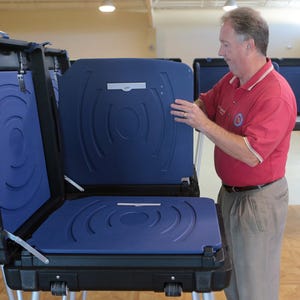This weekend’s attacks were much closer to his worldview than that of the Democrats.
For more than a year, Donald Trump has been raising an alarm about the upswing of terrorism in the United States, promising to address it head-on without any of Washington’s usual political pieties. Jargon-laden responses to terror attacks from the White House andHillary Clinton’s presidential campaign only tend to confirm Trump voters' worst fears about the Washington establishment, rather than build support for the Obama-Clinton approach to fighting the Islamic State terrorist group.
On Saturday a pressure cooker bomb detonated in a Manhattan dumpster, wounding 29. A second device was found blocks away and disarmed. This followed a pipe bombing that morning in Seaside Park, N.J., targeting the Marine Semper Fi 5K fundraising race. Fortunately, only one bomb detonated and no one was harmed.
On Sunday, five bombs were found in a backpack near a train station in Elizabeth, N.J. On Monday one suspected terrorist, Afghan immigrant Ahmad Rahami, was arrested after a shootout with police in Linden.
While all this was playing out on the East Coast, on Saturday a man went on a stabbing rampage at a mall in St. Cloud, Minn. , wounding nine people before being gunned down by an off-duty police officer. The assailant, Somali immigrant Dahir Adan, whom ISIL claimed as a “soldier,” asked one of his victims whether he was a Muslim before stabbing him.
Monday morning, White House spokesman Josh Earnest attempted to calm rattled public nerves, saying that “when it comes to ISIL, we are in a fight, a narrative fight with them, a narrative battle.” He assured us we are winning it. Democratic presidential candidate Clinton quickly echoed this line, and accused Trump of giving “aid and comfort” to the terrorists by counseling a get-tough approach against radical Islam that strays from the administration’s more restrained rhetoric.
Clinton’s charge against Trump of what amounts to treason has to be weighed against a grim reality. This weekend’s attacks were much closer to Trump’s worldview than that of the Democrats. The pattern — domestic terrorism allegedly committed by radical Muslim immigrants connected to, or inspired by, ISIL ideology — tracks the type of extremist threat Trump has been warning the country about all along. In addition, incidents over the last year in Chattanooga, San Bernardino and Orlando show similar attacker profiles and motivations. The problem isn’t an image-driven contest of conflicting narratives; it is a fundamental failure to secure America from violent radicals.
POLICING THE USA: A look at race, justice, media
This uptick in terrorism puts Clinton in a bind. She cannot critique the Obama administration ’s shaky counterterrorism strategy, but she cannot duck the reality that Americans are less safe than they were. Her only option then is to blame Trump. This is nothing new. Back in December, she falsely claimed that ISIL had recruiting videos featuring Trump. But the terrorists must have been listening to her because five months later, a video with a clip of Trump emerged. Essentially, Clinton wrote the Islamic State’s talking point.
This month, Clinton said ISIL is rooting for a Trump victory and it's saying, “Oh, please Allah, make Trump president of America.” For its part, ISIL has yet to release its official campaign endorsements. But it is hard to believe its leaders would be praying for a Trump victory given their successes. Clinton's charge that a vote for Trump is a vote for the Islamic State doesn't explain why the terrorist group wouldn’t rather keep the current policies under which it has been able to construct a global terror network with reach extending inside the USA.
Clinton has offered little in terms of new ideas to fight the growing domestic terror threat, if she even acknowledges the growing threat. She refuses to criticize President Obama for his failure to secure our borders from terrorism. And she usually eschews the words “radical Islamist terrorists,” which have been forbidden in the Obama administration's grand struggle over the narrative. Unfortunately, they also accurately describe the threat we are supposed to be fighting.
James S. Robbins writes weekly for USA TODAY and is the author of This Time We Win: Revisiting the Tet Offensive.


No comments:
Post a Comment